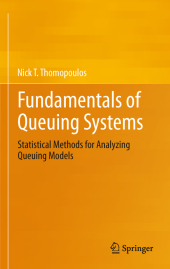 Neuerscheinungen 2014Stand: 2020-02-01 |
Schnellsuche
ISBN/Stichwort/Autor
|
Herderstraße 10
10625 Berlin
Tel.: 030 315 714 16
Fax 030 315 714 14
info@buchspektrum.de |

Nick T. Thomopoulos
Fundamentals of Queuing Systems
Statistical Methods for Analyzing Queuing Models
2012. 2014. xviii, 182 S. 4 SW-Abb.,. 235 mm
Verlag/Jahr: SPRINGER, BERLIN; SPRINGER NEW YORK; SPRINGER 2014
ISBN: 1-489-99203-0 (1489992030)
Neue ISBN: 978-1-489-99203-1 (9781489992031)
Preis und Lieferzeit: Bitte klicken
We spend lots of time queuing. Yet queues, their formation, and their duration, are a fascinating subfield of statistical research. This book details methods of analyzing queues that range from the most basic, such as M/M/1, to the most cutting-edge.
Waiting in lines is a staple of everyday human life. Without really noticing, we are doing it when we go to buy a ticket at a movie theater, stop at a bank to make an account withdrawal, or proceed to checkout a purchase from one of our favorite department stores. Oftentimes, waiting lines are due to overcrowded, overfilling, or congestion; any time there is more customer demand for a service than can be provided, a waiting line forms. Queuing systems is a term used to describe the methods and techniques most ideal for measuring the probability and statistics of a wide variety of waiting line models. This book provides an introduction to basic queuing systems, such as M/M/1 and its variants, as well as newer concepts like systems with priorities, networks of queues, and general service policies. Numerical examples are presented to guide readers into thinking about practical real-world applications, and students and researchers will be able to apply the methods learned to designing queuing systems that extend beyond the classroom. Very little has been published in the area of queuing systems, and this volume will appeal to graduate-level students, researchers, and practitioners in the areas of management science, applied mathematics, engineering, computer science, and statistics.
Introduction.- Preliminary Concepts.- One Server, Infinite Queue (M/M/1).- One Server, Finite Queue (M/M/1/N).- One Server, No Queue (M/M/1/1).- Multi Servers, Infinite Queue (M/M/k).- Multi Servers, Finite Queue (M/M/k/N).- Multi Servers, No Queue (M/M/k/k).- One Server, Arbitrary Service (M/G/1).- 2 Populations, One Server, Arbitrary Service (M/G/1/2).- M Machines, One Repairman (M/M/1/M).- M Machines, R Repairmen (M/M/R/M).- One Server, Repeat Service (M/M/1/ q ).- Multi Servers, Repeat Service (M/M/k/ ).- Tandem Queues (M/M/1 : M/M/1).- Priority System, One Server, Infinite Queue (M/M/1//P).- Priority, One Server, Arbitrary Service (M/G/1/P).- One Server, Constant Service (M/D/1).- Exponential Arrivals, Erlang Service (M/E2/1).- Erlang Arrivals, Exponential Service (E2/M/1).- Erlang Arrivals, Erlang Service (E2/E2/1).- Waiting Time Density, One Server (M/M/1).- Waiting Time Density, Multi Servers (M/M/k).- Bibliography.- Problems.- Solutions.
From the reviews:
"Fundamentals of Queuing Systems: Statistical Methods for Analyzing Queuing Models is a queuing theory book with practitioners as its target audience. ... the consideration of a number of special cases permits the author to provide tailored solutions to specific problems, an ideal situation for the reader who is looking for some formulae for those problems. ... Many real-world numerical examples are scattered throughout the book to provide the reader with opportunities to see how the formulae work." (David Hodge, Interfaces, Vol. 43 (6), November-December, 2013)


